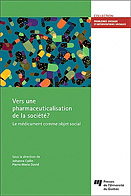
Johan Collin, Pierre-Marie David, (ed.)
Authors : Fanny Chabrol, Johanne Collin, Pierre-Marie David, Marilou Gagnon, Gabriel Girard, Fany Guis, Adrian Guta, Loes Knaapen, Larissa Kojoué Kamga, Pascale Lehoux, Marcelo Otero, Caroline Robitaille, Noémi Tousignant
The extension of the pharmaceutical field has been achieved in a novel way globally by the diffusion of drugs and clinical trials, but also on the more daily and individual levels of social life: work, sexual relations, academic success. The broadening of drug use and non-medical use now show that the drug is not controlled solely by medical control. The term "pharmaceuticalisation" refers precisely to the way in which moments of life become opportunities for the pharmaceutical industry.
However, as the contributions of this book show, the drug is more complex than a simple pharmaceutical object. It is more particularly analyzed in this book as an object allowing to evolve not only the borders of normal and pathological, but also those of inclusion and social exclusion, without necessarily going through the medical power. The technological evolution of recent years and the material effects of the drug also invite us to study how it contributes to the evolution of the frontier between nature and culture. The texts gathered in this book, from anthropology, history and sociology, present these new frontiers of medicine as a social object in societies in the North or the South, based on problems related to mental health, Tobacco, HIV, or cholesterol.
– Johanne Collin, sociologist and historian, is a full professor at the Faculty of Pharmacy of the Université de Montréal. She is the Director of the Medicine and Population Health branch of the Faculty of Pharmacy and Head of the Research Group on Médicament comme objet social (MEOS).
– Pierre-Marie David is a sociologist and pharmacist. He is currently a postdoctoral researcher at the Paris Diderot University (CNRS, SPHERE). He is also a lecturer at the Faculty of Pharmacy of the University of Montreal and a researcher associated with MEOS.
:: Presses de l’Université du Québec
:: Collection "Problèmes sociaux et interventions sociales"
:: 294 p.
:: ISBN 978-2-7605-4558-8
:: 2016
SUMMARY [Browse the book] [Download the fully detailed summary]
Introduction
- Aux frontières du médicament
Johanne Collin et Pierre-Marie David
PARTIE 1 – Psychotropes et usages élargis du médicament
- De l’ère du Valium à celle du Prozac : publicité sur les médicaments psychotropes et pharmaceuticalisation
Johanne Collin et Marcelo Otero
- Les psychostimulants dans l’espace virtuel : un autre regard sur la pharmaceuticalisation
Caroline Robitaille
PARTIE 2 – Accès aux médicaments et transformations sociales
- Les paradoxes de la pharmaceuticalisation de la santé publique en Afrique : les hépatites virales au Cameroun dans le sillon du VIH/sida
Fanny Chabrol
- L’inclusion sociale et politique des LGBT dans la lutte contre le VIH/sida au Cameroun : vers une citoyenneté thérapeutique ?
Larissa Kojoué Kamga
PARTIE 3 – Régulations du médicament et participations citoyennes
- Un devoir citoyen ? La qualité du médicament entre privé, public et global au Sénégal
Noémi Tousignant
- Mobilisation des patients et réglementation pharmaceutique : la performance de la participation publique à la FDA
Loes Knaapen et Pascale Lehoux
PARTIE 4 – Le médicament comme prévention
- Cholestérol, statines et prévention : apogée et chute de médicaments miracles
Pierre-Marie David
- « La pilule qui change tout » ? Analyse des débats québécois autour de la prophylaxie préexposition du VIH
Gabriel Girard
PARTIE 5 – Moralisation : le déplacement des responsabilités autour du médicament
- Déplacement des normes et responsabilités autour du traitement contre le VIH : le cas de la charge virale communautaire
Marilou Gagnon et Adrian Guta
- De la cigarette à la E-cigarette : figures tabagiques entre vice et maladie
Fany Guis



